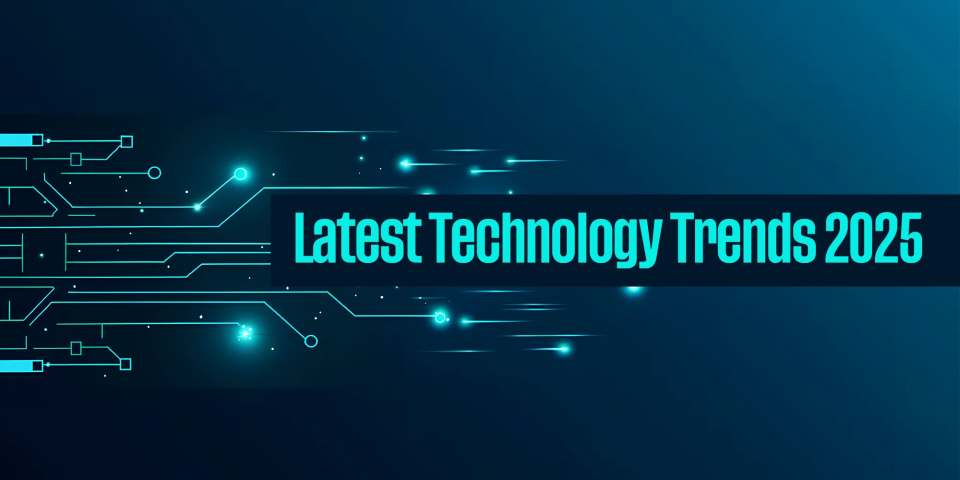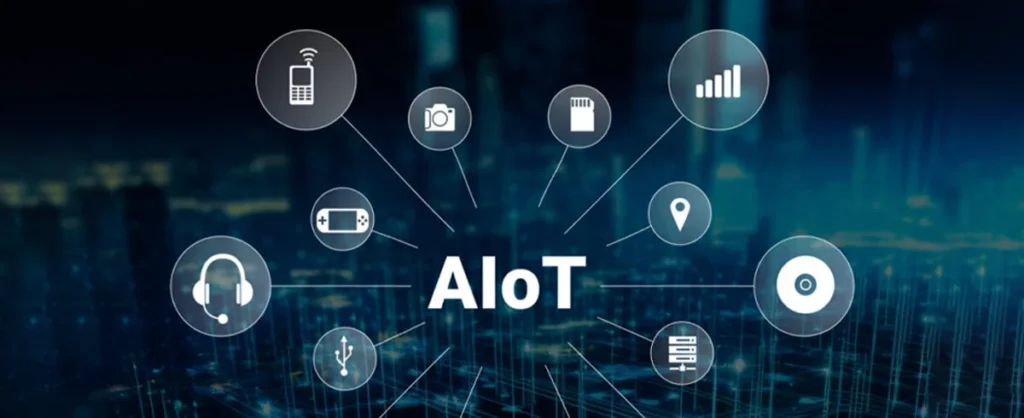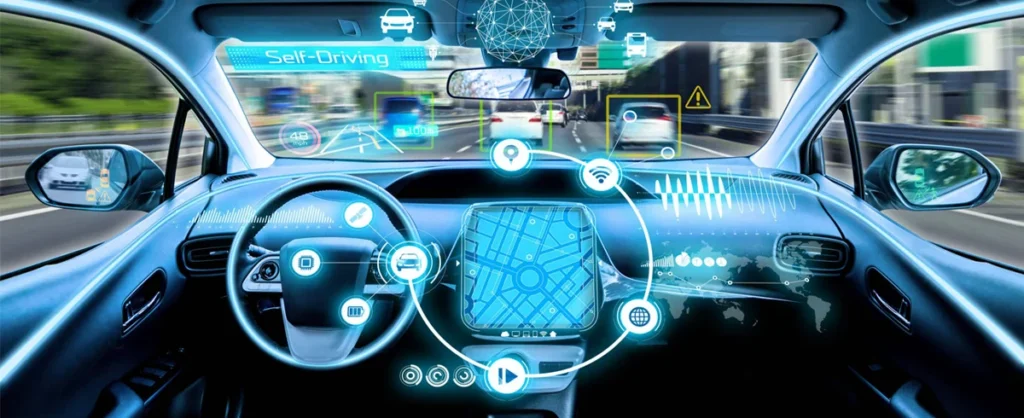Necessary Always Active
Necessary cookies are required to enable the basic features of this site, such as providing secure log-in or adjusting your consent preferences. These cookies do not store any personally identifiable data.
|
||||||
|
||||||
|
||||||
|

The latest technology trends are reshaping how we work, live, and interact with the world around us. The journey from bulky mainframe systems to sophisticated cloud infrastructures demonstrates the remarkable pace of current technology trends and technological progress. This continuous evolution consistently delivers enhanced simplicity, improved agility, and greater efficiency to organizations and individuals who embrace these emerging technology trends.
As we navigate through 2025, the latest technology trends showcase the relentless spirit of innovation driving the tech sector forward.
Staying current with the latest technology trends has become essential for maintaining market relevance. This blog talks about the latest technology trends and new technology trends poised to influence and transform industries throughout 2025.
Before we shed light on the latest technology trends of 2025, it is crucial to understand how AI is shaping technology trends. Technology trends in 2025 will aim to incorporate artificial intelligence technology in various innovations happening across different fields. With the growth in the adoption of generative AI, organizations are deploying automation in content creation, customer engagement, and customized communication. AI-Based Analytics are improving the decision-making process and therefore improving the way companies carry out their operations.

There is a dominance of AI in software creation to automate coding and testing phases and increase the speed of software creation. Top innovative technologies that incorporate AI into workplaces are also improving organizational efficiency through analytic data and repetitive processes.
Technology is moving at lightning speed, and it’s everywhere you look. From AI that can hold conversations to 5G networks that download movies in seconds, from solar panels getting cheaper every year to computers that process data right where you need it most, the changes are reshaping everything around us.
What does this mean for you? Whether you’re running a business, starting a career, or just trying to keep up with the latest innovations in technology, these shifts are creating new possibilities you’ve never imagined. Top innovative technologies that incorporate AI into workplaces are also improving organizational efficiency through analytic data and repetitive processes. The question isn’t whether technology will impact your life, it’s how you’ll use these top technology trends 2025 to your advantage. So what should you be watching for in 2025? Here are the game-changing latest technology trends that will likely touch your world in ways both big and small.

Artificial intelligence remains top on the list of latest technology trends after gaining popularity in 2023. An interesting aspect of AI that will be refined this year is generative AI. This type of AI is capable of creating new ideas and content, including images, conversations, videos, stories, and music. In 2025, generative AI will continue to drive advancements in healthcare, education, e-commerce, and the creative economy. Moreover, there are various research happening around Artificial General Intelligence (AGI) to help machines in developing self-awareness and consciousness.
Open-source AI solutions like OpenAI’s ChatGPT, Google’s Bard, Microsoft’s Bing Chatbot, and Meta’s Large Language Model Meta AI will continue to make AI accessible to the masses. These solutions remove the high costs associated with AI development, thereby driving emerging technology trends from startups and independent developers in 2025.
Among the latest technology trends is the focus on sustainable technology. As countries and businesses work towards realizing net-zero commitments, tech investments will be focused on solutions that minimize the impact of technology on the environment.
Environmental-friendly innovations that will receive widespread support include electric bikes, cars, and public transport. Other innovations may include solutions to novel environmental problems like carbon capture, storage and renewable energy technologies. In 2025, companies will embrace the green cloud computing concept where IT infrastructure and services prioritize the reduction of carbon emissions and energy consumption.
Among the key emerging technologies to look out for in 2025 are AI ethics and governance. Although AI brings unparalleled benefits and opportunities to companies, it comes with immense responsibility. When it comes to AI’s impact on people’s lives, questions about its ethics, legality, data governance, and trust rises. As businesses scale up AI usage, they must be mindful of existing and new regulations to ensure compliance. In 2025, AI ethics and governance will be a priority for countries and businesses.
As AI technology advances, countries that lack AI regulations will seek to develop them while those with existing frameworks will focus on enforcement. At the corporate level, businesses will define their mission and principles for AI and establish governance structures that inspire confidence in AI technologies. They’ll also strengthen their compliance with existing laws and regulations like the General Data Protection Regulation, monitor upcoming laws, and develop risk mitigation policies.
The global expansion of 5G networks continues to gather momentum in 2025, driving ultra-fast, low-latency connectivity across regions. This top technology trends 2025 leap is critical to the development of smart cities, industrial automation, and immersive experiences such as augmented reality (AR), mixed reality (MR) and virtual reality (VR).
One of the most significant impacts of 5G is its role in enabling remote work and telemedicine services. The high bandwidth and low latency of 5G technology facilitate seamless video conferencing, real-time data sharing, and remote device management, thus supporting increasingly distributed workforces and medical consultations without the limitations of conventional networks.
Additionally, connected transportation systems are benefitting from 5G capabilities, with vehicle-to-everything (V2X) communication enabling safer and more efficient traffic management. Public infrastructure is being integrated with sensors and actuators connected via 5G, allowing for intelligent lighting, real-time air quality monitoring, and adaptive traffic control.
A combination of AR/VR and the metaverse is already revolutionizing the way people work and live. It takes users from the real world to the virtual one.

Another important new technology trend to expect in 2025 is the rising preference for edge computing. Although cloud computing adoption continues to grow, companies are beginning to realize its shortcomings as their data volumes increase.
Edge computing solves this challenge by eliminating latency and pushing data processing closer to where it is generated instead of sending it to a centralized server. As businesses seek to process time-sensitive data remotely with limited connectivity, we’ll see a preference shift from cloud computing to edge computing in 2025.
Generative AI is changing how businesses and people create content, solve problems, and innovate. Generative AI can generate text, images, music, and even code, because of deep learning models, giving creative processes the efficiency of producing human-like quality. As these AI-driven tools are increasingly absorbed into the workflows of organizations, marketing, design, and software development are also seeing increased automation with improved productivity in these industries. This in turn also cuts down the time consumption and increases more opportunities in producing personalized content along with decision-making in real time.
The gaming technology of 2025 is one that will continue pushing the limits to immersion and interaction, based on the growth witnessed in AI, VR, and AR. AI-powered game engines develop more adaptive, intelligent NPCs with more realistic dynamic gameplay. There is a lot of growth also in cloud gaming, allowing anyone to play high-performance games regardless of hardware price. Meanwhile, ultra-responsive haptic feedback and next-gen graphics rendering enhance realism and bring digital worlds closer to life. Innovations that improve gameplay also make the experience more accessible and engaging for a global audience.
Autonomous vehicles will take giant strides in 2025, propelled by the progress of AI, sensor technology, and connectivity. Self-driving systems are becoming increasingly sophisticated, relying on real-time data from LiDAR, radar, and cameras to navigate complex environments with much greater accuracy. AI-powered decision-making improves vehicle safety, reducing human error, and optimizing traffic flow. And then there is more general testing and more gradual roll-out of autonomous vehicles in the city.
Self-driving trucks are perfect examples for optimizing the supply chain while autonomous shuttles improve the movement of urban spaces.

The year 2025 marks a shift towards continuous health monitoring driven by advanced wearable devices. These wearables integrate an array of sensors capable of real-time tracking of vital signs, glucose levels, and early disease markers, empowering both consumers and healthcare professionals to take a proactive role in health management.
Advanced wearables now allow for the detection of early indicators of chronic diseases, providing continuous insights into a user’s health without the need for invasive procedures. This shift enhances preventative healthcare and reduces the burden of reactive treatments by allowing for early interventions.
A major breakthrough in non-invasive diagnostics is the development of AI-powered imaging systems and biomarker blood tests. For example, specific blood tests now detect the Alzheimer’s p-tau217 biomarker with up to 90% accuracy, enabling earlier diagnosis and timely therapeutic interventions.
The integration of these latest technology trends is driving a paradigm shift in healthcare from episodic, treatment-centered care to continuous, prevention-focused management.
The proliferation of low-code and no-code development platforms in 2025 is democratizing technology development, enabling non-developers to build functional applications without extensive programming knowledge. These platforms empower business users and domain experts to create solutions tailored to their specific needs, accelerating digital transformation across organizations.
Low-code platforms provide visual development environments where users can drag and drop components, integrate APIs, and design workflows without writing extensive code such as Lovable, Synthesia, and Otter AI. No-code platforms simplify the process even further by offering ready-made templates and pre-configured integrations.
This latest technology trend has profound implications for businesses, as it reduces reliance on scarce technical talent, lowers development costs, and shortens time-to-market.
Commercial space tourism has moved closer to viability in 2025, led by major industry players such as SpaceX and Blue Origin. Suborbital flights are now available for private customers, offering a new frontier in luxury travel.
These developments are supported by evolving regulatory and safety frameworks designed to ensure the protection of passengers and the sustainability of the industry. Government agencies and private companies are collaborating to define standards for space travel safety, environmental impact, and operational protocols.
Space tourism is generating significant interest from high-net-worth individuals seeking unique experiences, while also contributing to top technology trends 2025 in aerospace engineering, materials science, and propulsion systems. As the industry matures, ticket prices are expected to decrease gradually, expanding accessibility and paving the way for a broader customer base.
Digital twin technology is experiencing significant growth in 2025, enabling the creation of real-time virtual models of physical systems. These digital replicas facilitate improved design, monitoring, and maintenance of assets across sectors such as manufacturing, urban planning, and infrastructure management.
By integrating sensor data and advanced analytics, digital twins provide predictive maintenance capabilities, allowing organizations to anticipate equipment failures before they occur and plan interventions proactively. This minimizes downtime, extends asset life, and optimizes operational efficiency.
In urban planning, digital twins simulate traffic patterns, energy usage, and environmental impacts, helping city planners design smarter and more sustainable urban environments. Infrastructure managers use digital twin models to monitor bridges, power grids, and transportation networks in real time, enhancing decision-making and reducing maintenance costs.
2025’s new technology trends show that the future of tech is indeed exciting. The growth trajectory in AI’s integration and accessibility is expected to continue across sectors. Emerging technologies will continue to offer new solutions to businesses and societal challenges. With a strong focus on green technologies and responsible AI, there’s no doubt that these trends will create a more sustainable, efficient, and connected future that benefits society.
Sign up to receive our newsletter featuring the latest tech trends, in-depth articles, and exclusive insights. Stay ahead of the curve!